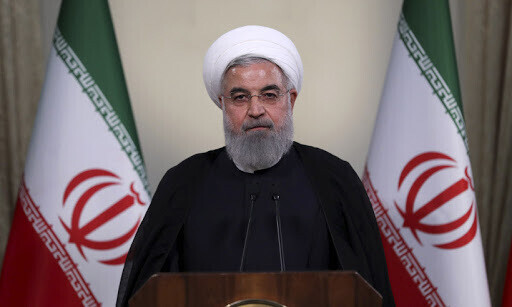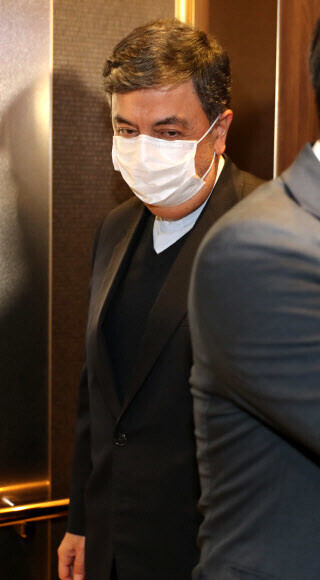hankyoreh
Links to other country sites 다른 나라 사이트 링크
Iranian president sent 2 letters to Moon to resolve US$7 billion frozen in Korean banks

Iran is reportedly pinning high hopes on a visit to Tehran by South Korean First Vice Foreign Minister on Jan. 10, despite their official stance that there is “no need for a diplomatic visit.”
They most likely hope Choi can help resolve the issue of US$7 billion in payments for Iranian crude oil that are currently frozen in South Korean banks.
Speaking to the Hankyoreh on Jan. 6, a diplomatic source closely acquainted with South Korea-Iran relations said, “Iran is hoping that Choi Jong-kun will bring a clear plan and blueprint for resolving the issue of frozen crude oil payments.”
“Iran wants to hear concrete plans for how they will be able to access their own money,” the source said.
Iran has reportedly requested around US$1 billion of the frozen assets to purchase medicine and medical equipment. For roughly a month, South Korea and Iran had been holding discussions on allocating a portion of the frozen US$7 billion toward vaccine purchases through the COVAX Facility, an international project for joint vaccine purchases. After the two sides reached an agreement, the South Korean government received approval from the US Treasury Department for an exemption from sanctions, but ran into hurdles when one of the two banks insisted that it could “not provide a guarantee on Iranian funds being wired to the Swiss bank where the COVAX Facility collection account is located due to US sanctions,” sources said.
The bank also provided an introduction to another bank in the US, explaining that converting the funds into dollars would require going through another bank. But Iran rejected this approach out of concerns that its funds would automatically be frozen upon being transferred to a US bank.

Iran has reportedly expressed disappointment over South Korea’s “excessively passive” approach to the issue over the past two-and-a-half years. The same source quoted above explained, “Iranian President Hassan Rouhani has sent two personal letters to President Moon Jae-in. Each time, the South Korean government has sent a reply, but there have been no practical measures.”
“If you add the funds deposited by [Iran’s] Bank Mellat into a Bank of Korea (BOK) reserve fund on top of the US$7 billion, it comes out to over US$9 billion [in Iranian funds trapped in South Korea],” the source said. “The lives of Iranian people depend on that money.”
Iran has continued to insist that its seizure of the MT Hankuk Chemi on Jan. 4 was related to a “technical matter” unrelated to the frozen payments. The same source explained, “There’s a process of jettisoning oil and adding water for the sake of the ship’s balance, and while there are no issues associated with this in large seas, the Persian Gulf is a special region and the environmental issues are severe.”
“It’s reading too much into things to tie the ship’s detention with the payment issue,” the source insisted.
By Park Min-hee and Gil Yun-hyung, staff reporters
Please direct comments or questions to [english@hani.co.kr]

Editorial・opinion
![[Column] Park Geun-hye déjà vu in Yoon Suk-yeol [Column] Park Geun-hye déjà vu in Yoon Suk-yeol](https://flexible.img.hani.co.kr/flexible/normal/500/300/imgdb/original/2024/0424/651713945113788.jpg) [Column] Park Geun-hye déjà vu in Yoon Suk-yeol
[Column] Park Geun-hye déjà vu in Yoon Suk-yeol![[Editorial] New weight of N. Korea’s nuclear threats makes dialogue all the more urgent [Editorial] New weight of N. Korea’s nuclear threats makes dialogue all the more urgent](https://flexible.img.hani.co.kr/flexible/normal/500/300/imgdb/original/2024/0424/7317139454662664.jpg) [Editorial] New weight of N. Korea’s nuclear threats makes dialogue all the more urgent
[Editorial] New weight of N. Korea’s nuclear threats makes dialogue all the more urgent- [Guest essay] The real reason Korea’s new right wants to dub Rhee a founding father
- [Column] ‘Choson’: Is it time we start referring to N. Korea in its own terms?
- [Editorial] Japan’s rewriting of history with Korea has gone too far
- [Column] The president’s questionable capacity for dialogue
- [Column] Are chaebol firms just pizza pies for families to divvy up as they please?
- [Column] Has Korea, too, crossed the Rubicon on China?
- [Correspondent’s column] In Japan’s alliance with US, echoes of its past alliances with UK
- [Editorial] Does Yoon think the Korean public is wrong?
Most viewed articles
- 1‘We must say no’: Seoul defense chief on Korean, USFK involvement in hypothetical Taiwan crisis
- 2N. Korean delegation’s trip to Iran shows how Pyongyang is leveraging ties with Moscow
- 3‘Weddingflation’ breaks the bank for Korean couples-to-be
- 4Korea sees more deaths than births for 52nd consecutive month in February
- 5[Column] Park Geun-hye déjà vu in Yoon Suk-yeol
- 6Will NewJeans end up collateral damage in internal feud at K-pop juggernaut Hybe?
- 7[Column] Has Korea, too, crossed the Rubicon on China?
- 8Amnesty notes ‘erosion’ of freedom of expression in Korea in annual human rights report
- 9Samsung barricades office as unionized workers strike for better conditions
- 10[Column] The clock is ticking for Korea’s first lady